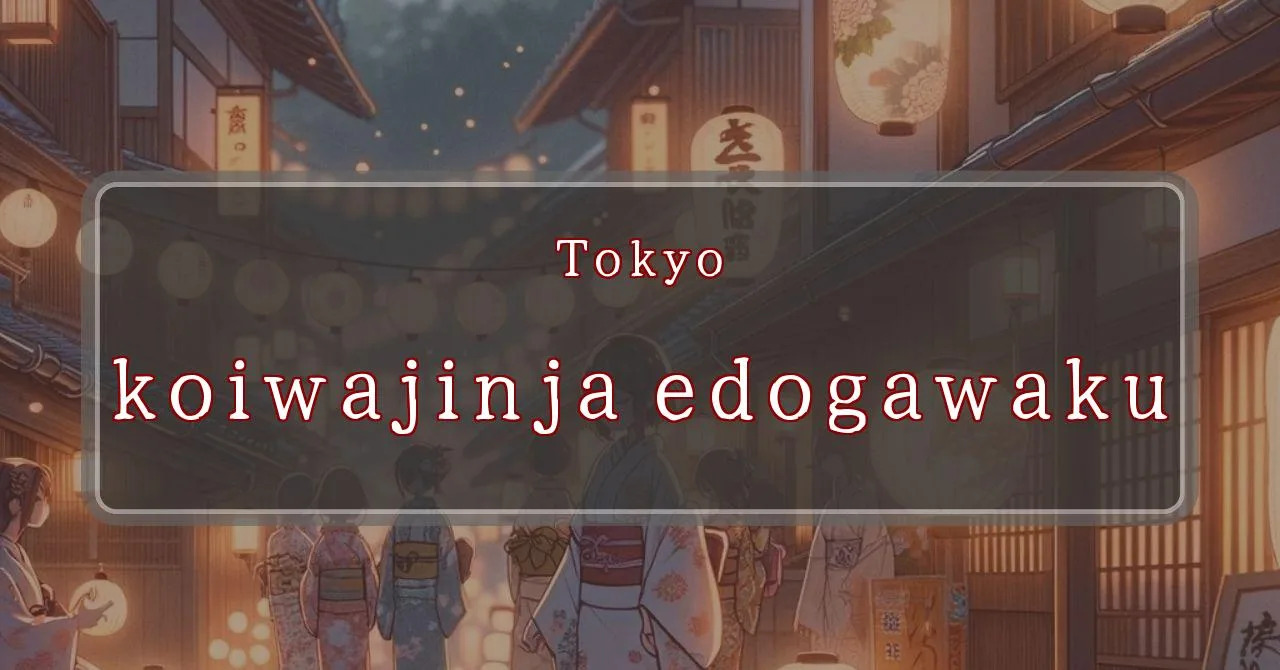Enchanting melodies and vibrant colors at the Koiwai Shrine Festival
Basic Information
The Koiwai Shrine Festival is an annual event held at the Koiwai Shrine in Edogawa Ward, Tokyo. The shrine is dedicated to the deity Amaterasu Omikami, the sun goddess in Japanese mythology. The festival is a celebration of the shrine’s annual summer festival, and it is one of the most popular festivals in the area.
- Address: 6-15-15 Higashi-Koigawa, Edogawa-ku, Tokyo
- Phone Number: 03-3657-6168
- Access: 10-minute walk from JR Koiwai Station
- Festival Days: July 19th (Sat), July 20th (Sun), 2024
Main Events and Attractions of the Festival
The Koiwai Shrine Festival is a two-day event held on July 19th and 20th, 2024. The festival features a variety of events and attractions, including:
Mikoshi Procession
One of the main highlights of the festival is the mikoshi procession. A mikoshi is a portable shrine that is carried through the streets by a group of people. The Koiwai Shrine mikoshi is a large and elaborate structure, and it is carried by a team of over 100 people. The procession begins at the shrine and winds its way through the streets of the neighborhood, accompanied by music and dancing.
Bon Odori Dance
Another popular attraction at the festival is the bon odori dance. Bon odori is a traditional Japanese folk dance that is performed during the Obon festival, which is a time to honor the spirits of the dead. The dance is performed in a circle, and participants hold hands and sing and dance together. Anyone can join in the bon odori dance, and it is a great way to experience Japanese culture.
Food and Games
The festival also features a variety of food and games. There are food stalls selling traditional Japanese festival foods, such as yakisoba, takoyaki, and cotton candy. There are also games for children, such as goldfish scooping and ring toss.
Fireworks Display
The festival concludes with a fireworks display on the evening of July 20th. The fireworks are launched from a nearby park, and they light up the night sky with their brilliant colors.
- Mikoshi Procession: A parade of portable shrines carried through the streets.
- Bon Odori Dance: A traditional Japanese folk dance performed in a circle.
- Food and Games: A variety of food stalls and games for children.
- Fireworks Display: A dazzling display of fireworks on the evening of July 20th.
Blessings and Deities
The Koiwai Shrine is dedicated to Amaterasu Omikami, the sun goddess in Japanese mythology. Amaterasu Omikami is the most important deity in the Shinto religion, and she is revered as the ancestor of the Japanese imperial family. She is also associated with light, warmth, and fertility.
- Deity: Amaterasu Omikami, the sun goddess
- Blessings: Good luck, prosperity, health, and happiness
Origin and History
The Koiwai Shrine was founded in the year 905. It is said that the shrine was built on the site of a sacred tree that was struck by lightning. The tree was believed to be a manifestation of Amaterasu Omikami, and the shrine was built to enshrine her spirit.
- Founded: Year 905
- Reason: Built on the site of a sacred tree struck by lightning, believed to be a manifestation of Amaterasu Omikami
Tips and Notes for Visitors
Here are some tips and notes for visitors to the Koiwai Shrine Festival:
- The festival is held on July 19th and 20th, 2024.
- The festival is free to attend.
- The festival is a popular event, so it is recommended to arrive early to avoid crowds.
- There are a variety of food and drink stalls at the festival.
- There are also a number of games and activities for children.
- The festival concludes with a fireworks display on the evening of July 20th.
Parking Information
There is limited parking available at the Koiwai Shrine. Visitors are encouraged to use public transportation or park in nearby parking lots.
- Limited parking available at the shrine
- Use public transportation or park in nearby parking lots
Popular Stalls and Food Carts in Recent Years
| Type of Stall | Description |
|---|---|
| Takoyaki | A staple at Japanese festivals. Characterized by a crispy outside and a creamy inside. |
| Jaga Butter | A simple yet popular snack of hot potatoes lavishly topped with melted butter. |
| Baby Castella | Small castella cakes, sweet and fluffy treats enjoyed by children and adults alike. |
| Grilled Ayu with Salt | Fresh ayu fish grilled whole with salt, a savory taste of Japanese summer. |
| Shaapin | A unique gourmet item influenced by foreign cuisine, with a chewy skin wrapping the filling. |
| Okonomiyaki | A Japanese grilled dish where you often choose your own ingredients for a personalized flavor. |
| Cotton Candy | A fluffy, sweet snack that’s extremely popular with children. |
| Chocolate Banana | A banana coated in chocolate, a fun and visually appealing dessert. |
| Kushiyaki | Various types of ingredients skewered and grilled, an easy-to-enjoy snack. |
| Yakisoba | Fried noodles mixed with a special sauce, a fast food favorite in Japan. |



